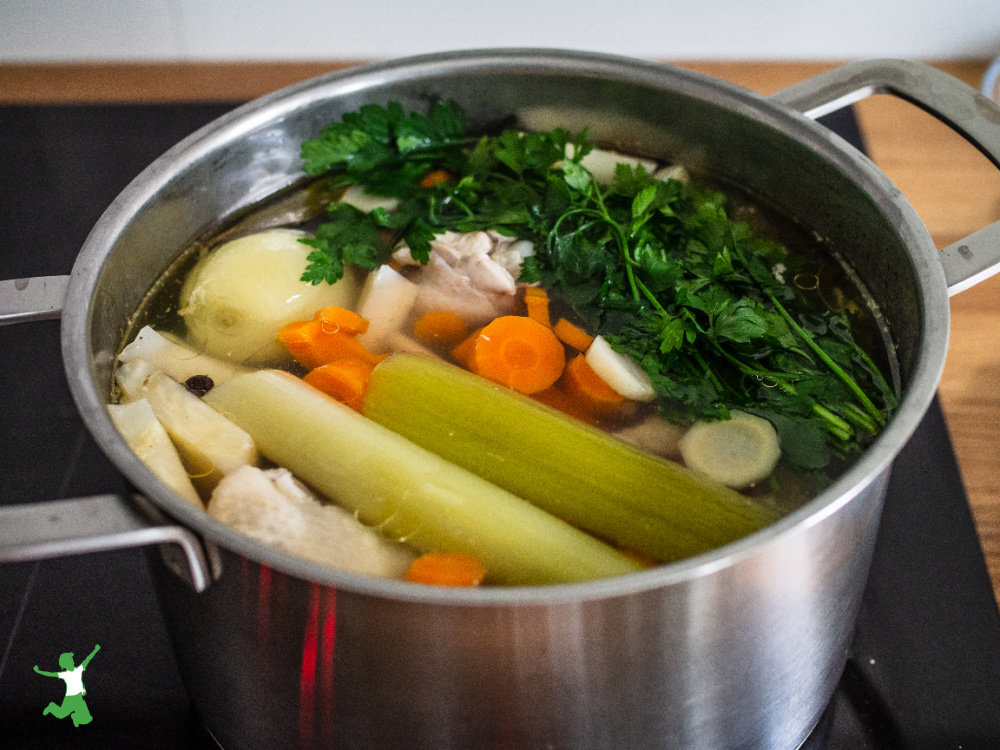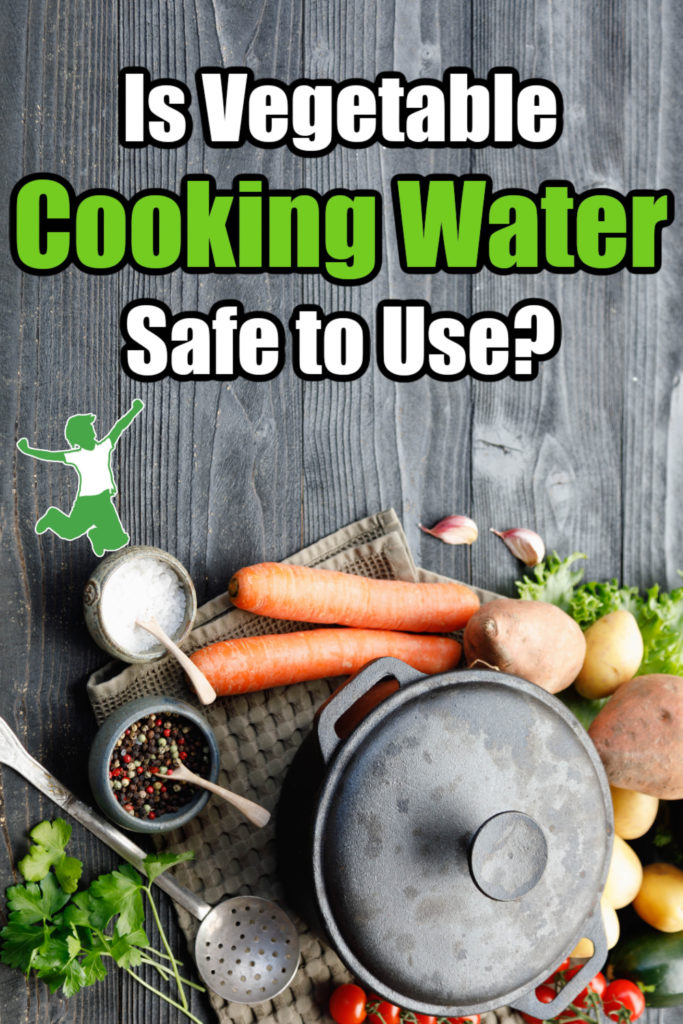Guidelines for when vegetable cooking water is safe to use and when it is best to toss due to nitrites, residues or anti-nutrients that can do more harm than good.

Adelle Davis popularized the practice of saving vegetable cooking water during the Leave it To Beaver era of the American 1950s.
She reasoned that any vitamins and minerals lost from cooking the vegetables would end up in the water.
This supposedly nutrient-rich cooking water could then be added to homemade soups or sauces with the nutrition benefiting those that consumed them.
This notion took hold and has not let go to this day.
Unfortunately, reserving vegetable cooking water can do more harm than good.
Consider the reasons below before you use it in your dishes. How to know your veggie cooking water is safe is discussed as well.
Chemical Residues
If the vegetables that are cooked are not organic, pesticides and nitrites from commercially produced fertilizers can end up in the cooking water.
Even low to no spray veggies such as asparagus would not be safe.
These crops are still typically fertilized with commercial preparations that are high in nitrites.
Anti-Nutrients
Cooking cruciferous vegetables such as broccoli, cauliflower, cabbage, Brussels sprouts, and kale would add goitrogenic (thyroid blocking) substances to the cooking water which should be discarded.
Water used to boil potatoes would contain chemicals called hemagglutinins that disrupt red blood cell formation.
Dark green, leafy vegetables such as beet greens, raw spinach, and chard contain oxalic acid that blocks calcium and iron absorption.
This irritating substance also can cause distress to the sensitive mucous membranes in the mouth and intestinal tract and contributes to the formation of kidney stones.
Consuming raw crucifers or dark, leafy greens is not an alternative either as the substances that cause problems when in the cooking water also cause problems if consumed directly with the vegetable in an uncooked state such as a raw green smoothie.
Legumes & Beans
For the last few years, the vegan community has popularized the trend of reusing legume cooking water, particularly from chickpeas.
This isn’t a safe practice even if the legumes or beans are soaked before cooking.
This soapy, slimy water is called aquafaba and is used as an egg replacement, particularly in dessert recipes. It whips up foamy just like egg whites.
Published research reveals that chickpea cooking water contains saponins, a potent anti-nutrient that contributes to leaky gut, which is at epidemic levels today.
It is also not advisable for pregnant women to consume this substance as it is a miscarriage risk.
Safe Vegetable Cooking Water
Do you really want to use vegetable cooking water as a frugal tool in your kitchen routine?
Consider this list of some of the most popular vegetables below. They are safe to use for that purpose.
- carrots
- turnips
- potatoes (peelings)
- parsnips
- beets
- celery
- organic pumpkins and squash (including zucchini)
- organic onions, leeks, and garlic
- nightshades (tomatoes, eggplant, and peppers among a few others)
For example, this potassium broth recipe uses vegetables simmered in water from the list above.
Simple Guidelines To Follow
Do you find it confusing to remember the distinctions between which organic veggies are safe to use and which are not?
Or, do you buy some veggies organic and others conventional?
If so, it is best to just adopt the practice of not using the cooking water at all.
This is particularly true if you tend to mix veggies together when cooking them.
Never Use Veggie Water for Baby Food
It is of particular importance NOT to use vegetable cooking water for use in pureeing homemade baby food.
Use pure filtered water instead, or if baby is old enough, some homemade bone broth or meat stock.
Final Caution to Consider
One final word of caution.
All vegetables tend to form nitrates after cooking and during storage. These nitrates can transform into strong carcinogens in the intestines.
Hence, it is best to avoid refrigerating and reheating vegetables, particularly leafy, green vegetables which concentrate nitrates when grown commercially.
References
Nourishing Traditions Cookbook









I stopped reading once you said this:
“If the vegetables that are cooked are not organic, pesticides and nitrites from commercially produced fertilizers can end up in the cooking water”
Why do people think organic means no pesticides? This is clearly nonsense.
Insecticidal soap is a pesticide used in organic agriculture. The difference is that it isn’t toxic if you ingest residual amounts. What I meant by that statement in the article is TOXIC conventional pesticides in nonorganic produce. It is backed by scientific inquiry as the body fluids of organic eating people contains far lower levels of TOXIC chemical residues than nonorganic eating people. Hope that makes more sense.
*Whose* ‘traditional’ soup recipes are you talking about? Seems a very western take on soup making! Asia, India, the rest of the world have been making soup from cruciferous and oxalate containing veg for centuries – without cooking first and throwing away the water – you can’t waste water like that in arid areas. Those people are a lot healthier. The act of cooking usually changes these compounds molecularly… Hence why most are cooked for safety… I agree about commercially produced veg and chemicals. That’s why we eat from our garden.
So raw fruits or vegetables bought and washed without cooking is dangerous to eat because it’s the same thing as cooking vegetables and drinking the water?
Where are the credible sources of this information? I only see a reference to a cookbook.
In your last paragraph you mention that green leafy vegetables give off nitrates when refrigerated. I gather that makes it unwise to cook more than you need for a meal. And I gather you shouldn’t be storing leftover soup/stew with green leafy veggies in it, even if they were cooked separately and the water thrown away.
Thanks for the reply Sarah. The recipe with the swiss chard is of Middle Eastern origin, I don’t know the time period but am guessing it’s something traditional.
Hello, I have a recipe which calls for raw chard to be cooked in a chicken soup/broth. Would it be best to cook the chard separately and then add it later, because otherwise aren’t I releasing the oxalic acids into the soup? And what about spinach, broccoli etc., is it ok to cook them in a stew or always best to cook separately and add in later? thank you.
GREAT question. Very few traditional soups and stews cook greens and crucifers in a broth that will be used for soup. Usually in traditional soups safe veggies were cooked directly in the soup such as carrots, celery, beets, squash, onions etc. My guess is that your recipe is modern (post WWII).
It is best to cook these types of veggies separately, toss the cooking water and then put the cooked crucifers or greens in the soup or stew. That’s what I do 🙂
In my 80’s it is difficult to eat enough greens. Are raw greens kale spinach etc used in smoothie a wise way to get sufficient nutrients? What do you suggest? Donna thank you!
Here are a couple of articles that provide guidance on which veggies can be healthfully eaten raw and which are best cooked to protect the thyroid and the kidneys. Hope that helps 🙂
https://www.thehealthyhomeeconomist.com/think-raw-veggies-are-best-think-again/
https://www.thehealthyhomeeconomist.com/how-green-smoothies-can-devastate-your-health/
Hello Sarah, I was searching for potato water uses and came across this thread. It was interesting and scary. Having become a vegetarian a year ago I’ve been struggling with nutrient rich and appealing foods to prepare while being mindful of uses of byproducts of the original foods. This made me curious if you were being an educated hypochondriac. 😉 Having said that I found these two links of great interest. The first is a study from the NIH. Of most interest is the boiled water topic. But, also some contradictory info about the veggie water you did say was safe. The second shows a list of veggies and their oxalic acid content. You essentially can’t avoid ingesting the stuff and really don’t want to because the diseases they fight, like cancer, surely outweighs the worry of kidney problems unless you have underlying kidney afflictions. Your feedback would be of interest! (Y)
ncbi.nlm.nih.gov/m/pubmed/15826055/
wikipedia.org/wiki/Oxalic_acid
But what about the water caught after steaming vegetables rather than boiling ? I use an electric steam cooker and it has a tray that catches the water from the condensation , supposedly filled with all the nutrients that have been sweated out of the vegetables while steaming . Is that bad too ?
If if is from veggies that contain oxalates and other anti-nutrients, then yes, it is problematic. If they are organic veggies that are fine to eat raw (carrots, celery, cucumbers etc) then that steam and/or cooking water is fine.